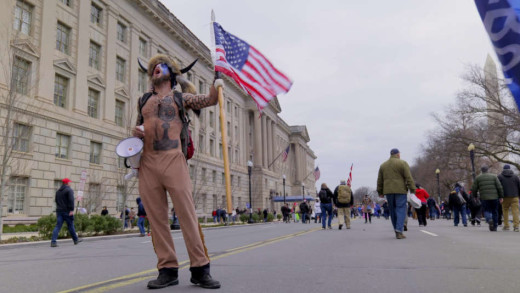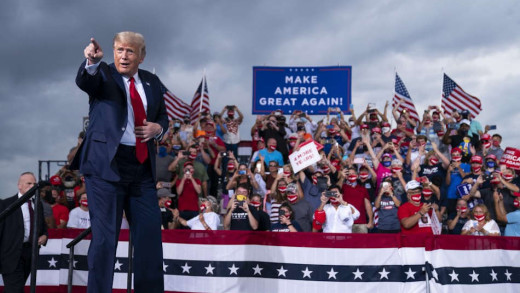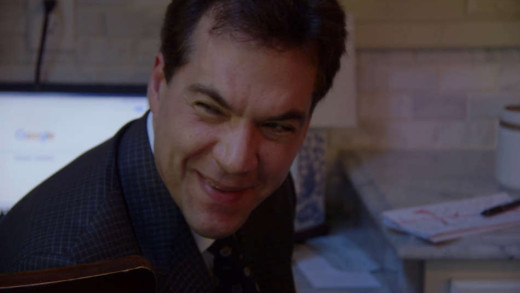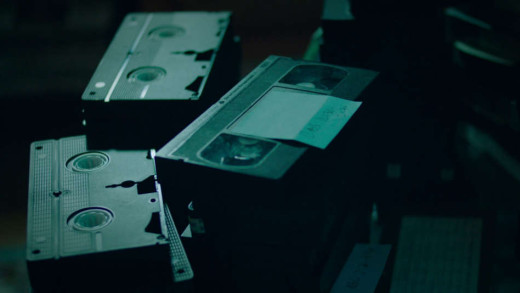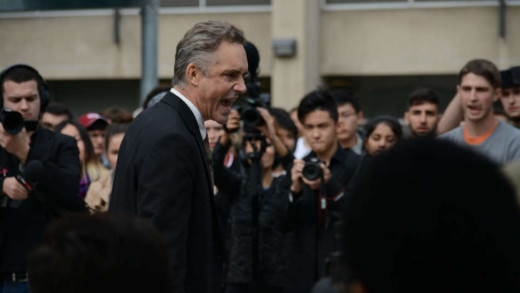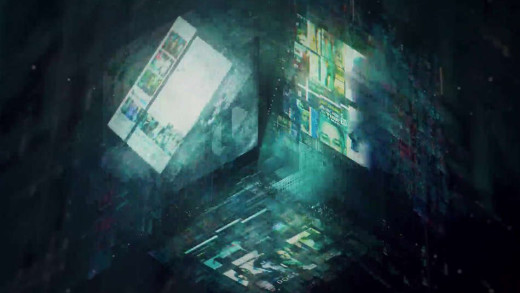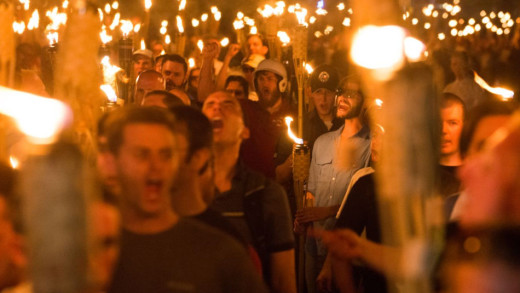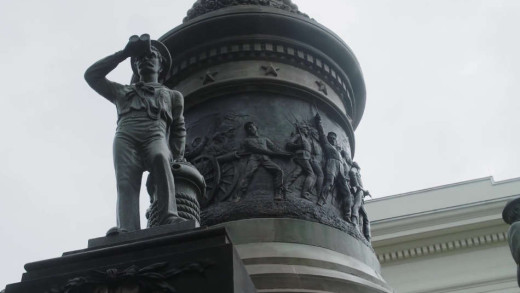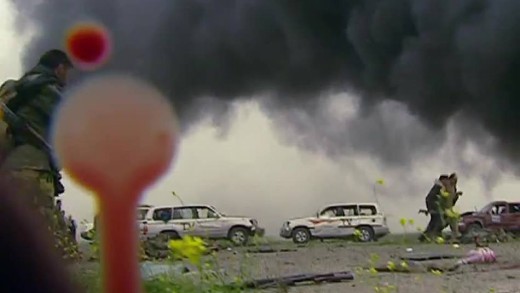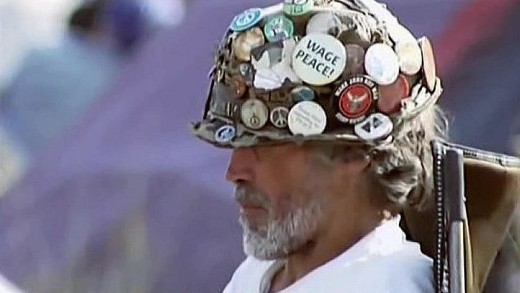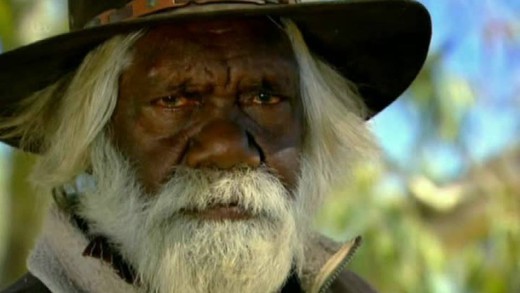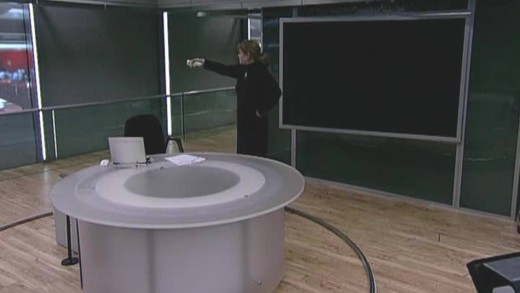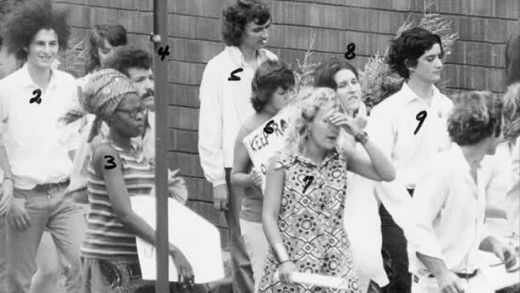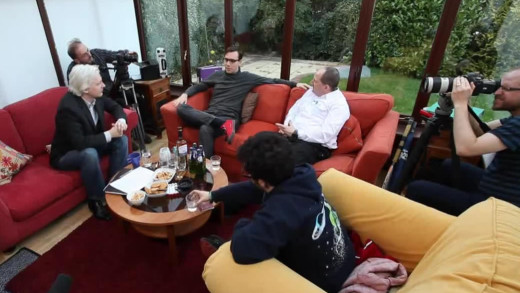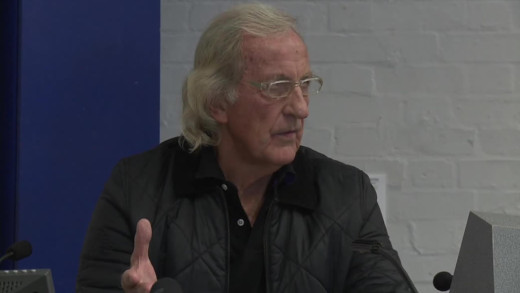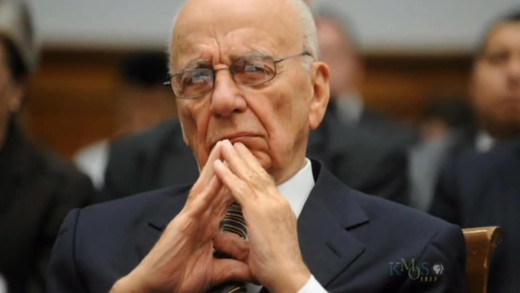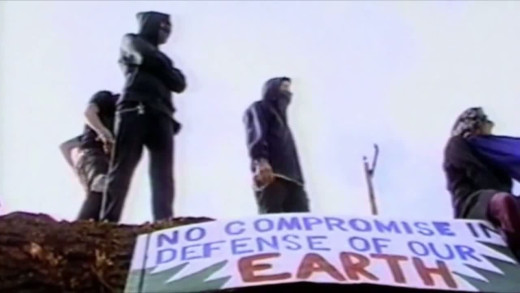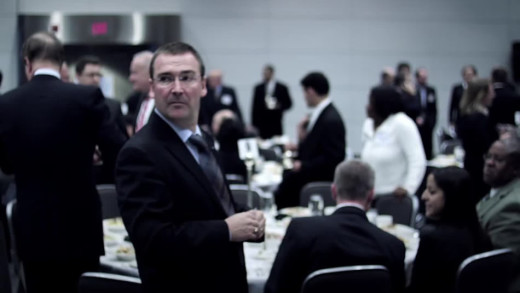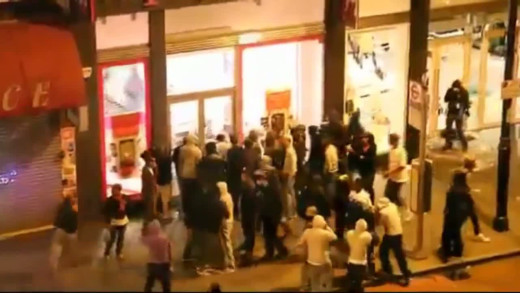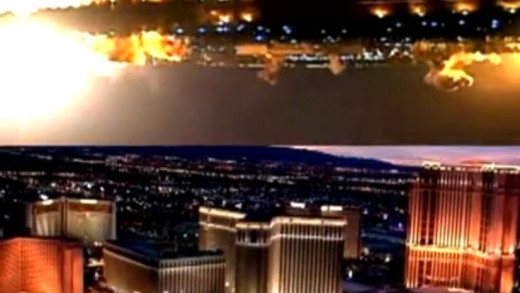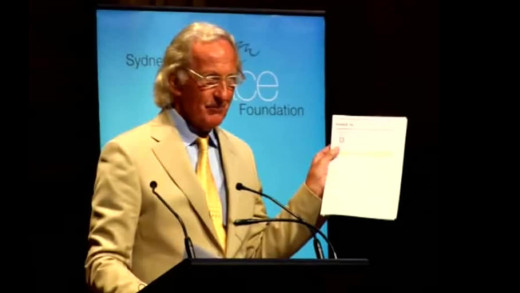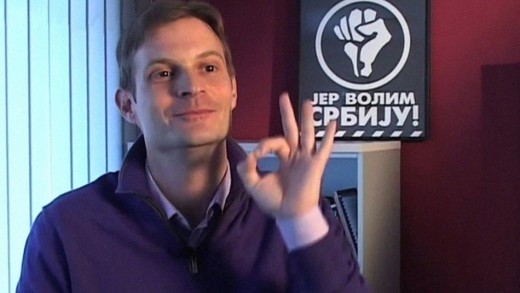Shifty
Shifty is a series of films that traverse the past 40 years in Britain, showing how the shift of political power to finance and hyper-individualism came together in powerful ways, to undermine one of the fundamental structures of mass democracy--the shared idea of what is real. As that fell apart, with it went the language and the ideas that people had turned to for the last 150 years to make sense of the world they lived in. As a result, life in Britain and the current and former colonies of its empire, has become strange--a hazy dream-like flux, where distrust in politicians keeps growing, and the political class seems to have lost control. Through archive footage, news reels, and on-screen-text in video essay format, Shifty documents the shapes of how this happened, using the vast ranges of footage to evoke what if felt like to live through an epic transformation during the 1980s.
Q: Into the Storm is a series that examines the far-right conspiracy theory QAnon that alleges there is a secret cabal of satan-worshipping, cannibalistic paedophiles running a global child sex-trafficking ring and plotting against former United States president Donald Trump. Spanning three years and traversing the globe, the series investigates the movement as it grows in scope and political significance, chronicling its evolution in real time, revealing how “Q” used information warfare to game the internet, hijack politics, and manipulate people's thinking. Filmmaker Cullen Hoback gains unprecedented access to key players in the spectacle, including Jim and Ron Watkins, the father/son team behind the 8chan website that “Q” calls home, and explores their rivalry with Fredrick Brennan, the original creator of the website. The series profiles “Q-tubers,” Q debunkers, political operatives, and journalists who have been closely following the movement since it began in 2017, showing connections between QAnon, President Trump, and political and ex-military operatives, as well as other various right-wing movements associated with 8chan, including "Gamergate" and "Pizzagate" that contextualises QAnon’s influence on culture and politics in the United States.
Can't Get You Out of My Head: An Emotional History of the Modern World is a six-part series that explores how modern society has arrived to the strange place it is today. The series traverses themes of love, power, money, corruption, the ghosts of empire, the history of China, opium and opioids, the strange roots of modern conspiracy theories, and the history of Artificial Intelligence and surveillance. The series deals with the rise of individualism and populism throughout history, and the failures of a wide range of resistance movements throughout time and various countries, pointing to how revolution has been subsumed in various ways by spectacle and culture, because of the way power has been forgotten or given away.
In the United States and elsewhere, both sides of politics have revelled in spectacle and image for many decades. But when Donald Trump, the billionaire reality-television host became president, a new escalation of image and spectacle engulfed dominant culture. The Trump Show is a series that explores the beguiling spectacle of the Trump years, through interviews with former White House staffers, media managers, campaign directors, and other personalities that were close to Trump during his presidency. The series documents how image has now replaced substance in politics in a totalising way, and how false constructions seek to pave over reality through a culture that is deeply rooted in hyper-individualism, fierce and corrupt competition, ideological dogmatism, and post-modern delusions.
After Truth
After Truth is about the growing proliferation of modern disinformation, where almost anybody with a computer and social media access can have a powerful platform without oversight, influencing the information experiences of billions of people. The melting pot is catalysed by Facebook, Twitter, Reddit, 4chan, and other websites that spread disinformation to huge audiences with a profit incentive, competing to capture everyone's attention. After Truth asks the question about where all this is heading, by exemplifying events such as Jade Helm, Seth Rich, and Pizzagate, but also profiling some major and minor personalities involved in spreading disinformation, conspiracy theories, fear, and uncertainty. With an empire in collapse, and physical reality being increasingly replaced by popular postmodern theories of "there is only subjective truth," this film not only presents the challenge of returning to what is real, but the task of stopping disinformation from continuing to divide, confuse, distract, and destroy.
Marion Stokes was secretly recording television twenty-four hours a day for thirty years. It started in 1979 with the Iranian Hostage Crisis at the dawn of the twenty-four hour news cycle, and ended in 2012 while the Sandy Hook massacre played on television as Marion passed away. In between, Marion recorded on 70,000 VHS tapes, capturing revolutions, lies, wars, triumphs, catastrophes, bloopers, talk shows, advertising--all of which deeply show how television has shaped the world of today. Remarkably prescient, Marion knew this, and saved it as a form of activism, knowing that archiving everything that was said and shown on television was part of the fight for the truth and historical memory, keeping those in power accountable. At the time, the public didn’t know it, but TV networks themselves were not keeping archives of their material, with huge swathes of recorded history lost. If it wasn't for Marion, and the Internet Archive that will soon digitise her tapes for prosperity and free public access, these records would be lost forever. This film is about a radical Communist activist, who became a fabulously wealthy recluse archivist, and whose work was unorthodox, but also genius, even though she would pay a profound price for dedicating her life to such a visionary project.
University of Toronto psychology professor Jordan Peterson launched into the public eye after he published a controversial video series entitled Professor Against Political Correctness in 2016. Within 2 years, he sells over 3 million copies of his self-help book, appears on numerous television shows, and fills theatres with his lectures. At the same time, he endures a swell of backlash, including that from a former colleague that now labels him as a dangerous threat. After mobilising some on the right for his criticisms of the left, Peterson fends-off being labelled a right-wing figurehead while moving through the media spectacle, arguing his shifting philosophical views. Filmed during this period of Peterson's rise to fame, and told through family, friends, and foes, The Rise of Jordan Peterson presents a complex kaleidoscopic narrative and personal portrait, enabling the viewer to examine Peterson in several different ways, while considering his wide and often conflicting range of perspectives and social commentary.
The Great Hack is an inside account of the company Cambridge Analytica, which used vast amounts of personal data scraped from portals such as Facebook to manipulate elections throughout India, Kenya, Malta, Mexico, the United Kingdom and United States over the past decade. The company, owned by SCL Group--a British firm that has a background in military disinformation campaigns and psychological warfare--came to public attention after the Brexit campaign in the UK, and soon after, the election of Donald Trump in the United States, both closely worked on by Cambridge Analytica and its billionaire backer, Robert Mercer. This resulted in inquires and investigations into both Facebook and Cambridge Analytica, but the company liquidated, along with its internal documents. Two former employees instead step forward to offer an inside account into the dark world of data mining and personalised propagandising, having some regret for what they have done. The film tracks these characters, as Cambridge Analytica lives on as Emerdata Limited, in the same London office. The Great Hack exemplifies big questions about democracy in the age of targeted information manipulation via the screen, and just how much power over our awareness has been ceded to giant corporations.
Investigate journalist A.C. Thompson reports on the background of the white supremacists and neo-Nazis involved in the "Unite the Right" rally in Charlottesville, 2017. The event itself was chaotic and violent, amidst a backdrop of general passivity by the police and supine intelligence agencies, peaking on the day with a self-identified white supremacist ramming his car into a crowd of protesters, killing a young woman, Heather Heyer, and injuring 19 other people. Documenting Hate contextualises the events of that day by looking at the renewed trajectory of fascism in the United States, and the kinds of people attracted to its place in modern times, while profiling some of the characters from Charlottesville that lurked in the background. The second part of the investigation deals with the wake of the deadly anti-Semitic attack at the Tree of Life synagogue in Pittsburgh, showing how a neo-Nazi group, Atomwaffen Division, has actively recruited inside the United States military.
In the United States, during the first year of Donald Trump's presidency, the rise of a white supremacist movement has returned, as political energy is injected into neo-confederate, neo-fascist, neo-Nazi, Klansmen, and various right-wing militia groups. More broadly, civil rights organisations such as Antifa (Anti-Fascist) and social justice groups are fighting back. Alt-Right: Age of Rage follows the development the Alt-Right, by following social justice activist Daryle Lamont Jenkins, and renowned Alt-Right leader Richard Spencer. Each movement is juxtaposed, as tensions boil over to the horrific events in Charlottesville where a young woman is killed, and 30 others injured by a self-identified neo-Nazi. Through these narratives and events, the film surveys the workings of Free Speech, deplatforming by the Left, the role of the Internet, and the consequences of fractured politics playing out in the real physical world.
HyperNormalisation wades through the culmination of forces that have driven this culture into mass uncertainty, confusion, spectacle and simulation. Where events keep happening that seem crazy, inexplicable and out of control—from Donald Trump to Brexit, to the War in Syria, mass immigration, extreme disparity in wealth, and increasing bomb attacks in the West—this film shows a basis to not only why these chaotic events are happening, but also why we, as well as those in power, may not understand them. We have retreated into a simplified, and often completely fake version of the world. And because it is reflected all around us, ubiquitous, we accept it as normal. This epic narrative of how we got here spans over 40 years, with an extraordinary cast of characters—the Assad dynasty, Donald Trump, Henry Kissinger, Patti Smith, early performance artists in New York, President Putin, Japanese gangsters, suicide bombers, Colonel Gaddafi and the Internet. HyperNormalisation weaves these historical narratives back together to show how today's fake and hollow world was created and is sustained. This shows that a new kind of resistance must be imagined and actioned, as well as an unprecedented reawakening in a time where it matters like never before.
In Requiem for the American Dream, renowned intellectual figure Noam Chomsky deliberates on the defining characteristics of our time—the colossal concentration of wealth and power in the hands of the few and fewer, with the rise of a rapacious individualism and complete collapse of class consciousness. Chomsky does this by discussing some of the key principles that have brought this culture to the pinnacle of historically unprecedented inequality by tracing a half century of policies designed to favour the most wealthy at the expense of the majority, while also looking back on his own life of activism and political participation. The film serves to provide insights into how we got here, and culminates as a reminder that these problems are not inevitable. Once we remember those who came before and those who will come after, we see that we can, and should, fight back.
Bitter Lake
Bitter Lake explores how the realpolitik of the West has converged on a mirror image of itself throughout the Middle-East over the past decades, and how the story of this has become so obfuscating and simplified that we, the public, have been left in a bewildered and confused state. The narrative traverses the United States, Britain, Russia and Saudi Arabia—but the country at the centre of reflection is Afghanistan. Because Afghanistan is the place that has confronted political figureheads across the West with the truth of their delusions—that they cannot understand what is going on any longer inside the systems they have built which do not account for the real world. Bitter Lake sets out to reveal the forces that over the past thirty years, rose up and commandeered those political systems into subservience, to which, as we see now, the highly destructive stories told by those in power, are inexorably bound to. The stories are not only half-truths, but they have monumental consequences in the real world.
War Matters
War Matters chronicles a decade of anti-war protest in Britain through the story of veteran peace campaigner Brian Haw, who camped in Parliament Square for over 10 years in protest against the UK government's policies in the Middle East. Brian began his campaign against war on 2nd June 2001, initially in protest of the sanctions against Iraq. After the September 11 attacks in the United States later on that year, Brian's campaign took on a whole new level of importance. War Matters documents this shift by examining the larger issue of the British arms trade and the repercussions of the Iraq and Afghanistan wars around the world, as civil rights are being curtailed in so-called democracies. Where does democracy end and tyranny begin?
Utopia
Utopia is both an epic portrayal of the oldest continuous human culture on the planet--indigenous Australia--and an investigation into a suppressed colonial past and rapacious present. One of the world's best kept secrets is revealed against the great Australian 'mining boom,' showing how the country's racially divided past and current-day media collusion play their parts in a system that is apartheid in all but name. The film examines the exploitation of the Aboriginal population, both as a people and of the land they have lived on for centuries, and how so many institutions have profited while people continue to suffer. The injustice stretches across countless generations and stories. Utopia reveals this universal story of power and resistance, driven by old imperatives, in a media age of saturation which is profoundly silent and complicit; a call to continue resistance.
Oh Dearism II
A look back on the news events from 2014 reveals a confusing, muddled mess. Things are increasingly chaotic, along with the reporting of the events in the culture of 24-7 rolling news, sound-byte feeds and the Internet. The result, as we see, is not a coherent public understanding of these complex events, but more a profound mass-confusion, with discourse destroyed, which in-turn broods disengagement from the world and further atomises an already divided-and-conquered public. It is this response that is a powerful form of social control, and is by design...
Persons of Interest is a four part series where former activists and political dissidents are given their previously secret ASIO files and asked to explain the allegations contained in them. As a result, the series unravels the hidden political and cultural history of Australia that is still being unmasked today in a world gripped by confirmations of mass surveillance abuses by ASIO and other intelligence agencies such as the NSA in the United States. Using the content of the ASIO records themselves along with genuine surveillance footage, this series tells the story of spies, traitors and intelligence intrigue in Australia against a backdrop of the big political events of the 20th century; at a time when fear of Communism, outsiders and threats to the established order fostered the construction of a vast and secret network of surveillance on ordinary people.
Cypherpunks is a movement originating from the 1980s aiming to improve Internet privacy and security through proactive use of cryptography. With WikiLeaks being a recent offshoot of the many projects derived from the Cypherpunk movement, WikiLeaks editor Julian Assange talks with three activists from the Cyberpunk world to cover the topics of mass surveillance and social control being tied directly into technology as modern society progressively intertwines with technological progress...
John Pilger talks about the various mainstream media commonalities of today--censorship by omission, information management, Public Relations and the 'massaging of information', as well as the clever distractions such as the election of Obama as a war monger in the land of slavery, alongside figures such as Hillary Clinton and Julia Gillard as a false win for so-called 'feminist ideals.' Amongst the ongoing wars played by the United States, Britain and Australia, Media And War -- Challenging The Consensus is a renewed call to unravel complex propaganda and cut through distractions.
Over half a century, Rupert Murdoch's rapacious business audacity has built one of the world's most powerful and ubiquitous media empires. But with revelations of bribery, blackmail, collusion with police and government, wiretapping and other invasions on privacy, the empire seems to be showing cracks. The scandal has prompted criminal investigations on both sides of the Atlantic and also broken open the insular world of the Murdoch family, its news executives, and the vast political elite who court their favour. Murdoch's Scandal tells the story of the battle over the future of News Corporation and the challenging of the extensive media empire...
The Power Principle is a series of films examining the history of the United States and the building of its empire with particular emphasis on the last seventy years of United States foreign policy. The methods that make empire possible are also examined—the politics of fear, the rise of public relations, the 'Mafia Principle' and the reoccurring use of fabled enemies, contrasting the Soviet Union and the Cold War alongside the parallels of today with the "War On Terror". Not only does The Power Principle tie together historical events to revive a common thread, the series may also encourage viewers to reconsider their understanding of historical events and the portrayal of them, showing how those in power play a role in manipulating the collective memory through generations.
People from industrial civilisation are fast to defend it, saying that they depend on this way of life for survival. It's an addiction. But what if civilisation is the very thing that is killing us and everyone else around? How could we survive then? The Fuck-It Point is about this pervasive disabling mindset of civilisation, its true cost, why and how we need to stop it from killing the planet, and why most people from civilisation don't want to do this. Will you do what is necessary to stop this culture from killing the planet?
Brussels, the capital and largest city of Belgium, has a long history of hosting the institutions of the European Union within its European Quarter; while the Union itself claims it has no capital and no plans to declare one--despite the fact that Brussels hosts the official seats of the European Commission, Council of the European Union, and European Council, as well as a seat of the European Parliament. In any event, it is here--in this centre of smoke and mirrors--that exists one of the largest concentrations of lobbyist power in the world. The Brussels Business scratches the surface of this extensive world hidden-from-view by looking at the direct influence of lobbyists and the complete lack of transparency in the decision-making processes. Speaking with lobbyists and activists themselves, The Brussels Business reveals the beginnings of a vast landscape of PR conglomerates, front companies, think-tanks and their closely-interlinking networks of power and ties to political and economic elites. The questions then become: Who actually runs the European Union? How? And why?
Perfect Storm offers an initial analysis of the underlying causes and wider context surrounding the riots throughout England in 2011. Contrary to the portrayals presented by mainstream media and trite political rhetoric around law and order, the riots were sparked by poverty, inequality and frustration over police killing a young man in Tottenham. How does the damage weigh up to the criminal conduct of banks and corporate tax avoiders when the costs of the riots are over four thousand times less than the recent financial crisis? Whose priorities are at play here?
END:CIV
By examining the modern culture of industrial civilisation and the persistent widespread violence and environmental exploitation it requires, END:CIV details the resulting epidemic of poisoned landscapes and shell-shocked nations, while further delving into the history of resistance and the prospect of fighting back against such abuse. Detailed is an overview of the environmental movement analogous with the historical whitewashings of the supposedly 'pacifist' social struggles in India with Gandhi and Martin Luther King in the United States; the rise of greenwashing and the fallacy that all can be repaired by personal consumer choices. Based in part on 'Endgame,' the best-selling book by Derrick Jensen, END:CIV asks: If your homeland was invaded by aliens who cut down the trees, poisoned the water, the air, contaminated the food supply and occupied the land by force, would you fight back?
John Pilger talks at a public forum in Sydney about the recent revelations of WikiLeaks and the importance of leaked information in exposing the lies and machinations of Public Relations in mainstream media and political rhetoric. Pilger demonstrates the parallels with the plight of Julian Assange and the treatment of David Hicks through the United States legal system, and also explains using recent leaked documents why state power sees investigative journalists and others as a major threat to the established order...
The Revolution Business examines the role of United States intelligence agencies in the recent revolutionary movements such as the Arab Spring and others by the use of "Revolution Consultants." Of particular interest is a Serbian man Srđa Popović, who formed an organisation called Отпор! (Otpor) which tought "non-violent struggle" in the overthrow of Slobodan Milošević in Serbia during the 1990s, and which has now gone on to inspire a new generation of activists. However, some political commentators like William Engdahl are convinced that Otpor is financed by the United States and has ties to intelligence agenices, also having dubious funding from sources such as the Rand Corporation, the Department of Defence, as well as various fronts such as the National Endowment for Democracy (NED), the International Republican Institute (IRI), the US Institute of Peace and the Ford Foundation--all of which have a long history of collaborating with the Pentagon, the State Department and the CIA in destabilising movements and usurping popular uprisings, removing their teeth.
Freedom Riders follows the story of hundreds of civil rights activists who rode interstate buses into the segregated southern United States during the 1960s to challenge local laws enforcing segregation in seating. The Freedom Rides, and the violent reactions they provoked, bolstered the credibility of the American Civil Rights Movement. They called national attention to the disregard for the federal law and the local violence used to enforce segregation in the southern United States. This is the story of the numerous waves of people who challenged the mores of a racially segregated society by performing a disarmingly simple act.

